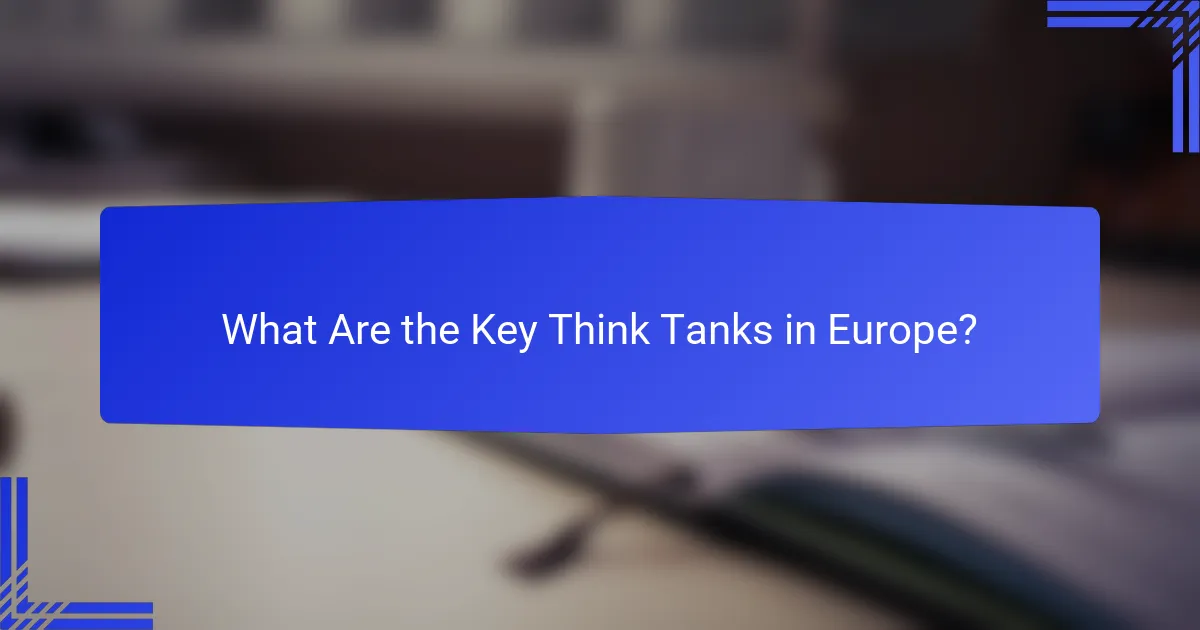Think tanks in Europe play a vital role in shaping public policy by conducting in-depth research and providing strategic recommendations to policymakers. Their expertise allows them to analyze complex issues and influence decision-making processes, making them essential intermediaries between academic insights and practical policy implementation.

How Do Think Tanks Influence Public Policy in Europe?
Think tanks in Europe significantly shape public policy through rigorous research, strategic recommendations, and active engagement with stakeholders. Their ability to analyze complex issues and propose actionable solutions makes them key players in the policy-making process.
Research and Analysis
Think tanks conduct extensive research to inform public policy debates. They analyze data, trends, and case studies to provide evidence-based insights that policymakers can rely on. This research often covers a wide range of topics, including economics, social issues, and environmental policies.
For example, a think tank might examine the impact of immigration policies on labor markets, providing quantitative data that can guide legislative decisions. Their findings are typically published in reports, policy briefs, and academic articles, making them accessible to both policymakers and the public.
Policy Recommendations
After conducting research, think tanks formulate policy recommendations aimed at addressing specific challenges. These recommendations are often tailored to the political and economic context of the country or region, ensuring relevance and feasibility. They may suggest reforms, new programs, or changes to existing regulations.
For instance, a think tank might propose a new tax incentive to boost renewable energy investments in the EU, backed by data showing potential economic benefits. Such recommendations are crucial for guiding government actions and priorities.
Stakeholder Engagement
Engaging with various stakeholders is essential for think tanks to effectively influence public policy. They often collaborate with government officials, business leaders, and civil society organizations to build consensus around their recommendations. This engagement helps to ensure that diverse perspectives are considered in the policy-making process.
Think tanks may organize workshops, roundtable discussions, or public forums to facilitate dialogue among stakeholders. By fostering these connections, they enhance the legitimacy of their research and recommendations, making it more likely that policymakers will adopt their proposals.

What Are the Key Think Tanks in Europe?
Key think tanks in Europe play a crucial role in shaping public policy through research and analysis. They provide insights on various issues, influencing decision-makers and public discourse across the continent.
Chatham House
Chatham House, based in London, is renowned for its independent research on international affairs and global challenges. It focuses on policy-oriented research and engages with governments, businesses, and civil society to foster informed debate.
The think tank is particularly influential in areas such as foreign policy, security, and climate change. Its publications and events often shape discussions in both the UK and broader European contexts.
Bruegel
Bruegel, located in Brussels, specializes in economic policy and aims to improve the quality of economic governance in Europe. It conducts rigorous research and analysis, focusing on issues like economic growth, trade, and innovation.
Bruegel’s work is particularly relevant for policymakers in the European Union, as it provides evidence-based recommendations on economic reforms and integration. Its collaborative approach often involves partnerships with other research institutions and stakeholders.
Centre for European Reform
The Centre for European Reform (CER) is a London-based think tank that focuses on the European Union’s role in global affairs. It aims to promote a more effective and democratic Europe through research and policy recommendations.
CER addresses key issues such as Brexit, EU governance, and transatlantic relations. Its reports and events are designed to inform policymakers and the public about the challenges and opportunities facing Europe today.

What Role Do Think Tanks Play in Shaping Legislation?
Think tanks significantly influence legislation by conducting research, providing expert insights, and facilitating discussions among policymakers. They serve as critical intermediaries between academic research and practical policy implementation, often shaping the legislative agenda in Europe.
Drafting Policy Proposals
Think tanks often take the lead in drafting policy proposals that address pressing social, economic, and environmental issues. By leveraging their research capabilities, they create detailed documents that outline potential solutions and recommend specific actions for lawmakers.
These proposals typically include background information, analysis of current policies, and suggested reforms. For example, a think tank might propose new regulations for renewable energy to meet European Union climate targets, providing a framework for legislative action.
Providing Expert Testimony
Think tanks frequently provide expert testimony during legislative hearings, offering insights based on their research and expertise. This testimony can help legislators understand complex issues and the implications of proposed policies.
Experts from think tanks may present data, case studies, and best practices, which can significantly impact decision-making. Their contributions often help clarify the potential benefits and drawbacks of specific legislative measures, guiding lawmakers toward informed choices.
Influencing Political Discourse
Think tanks play a vital role in shaping political discourse by framing issues and promoting specific narratives. Through publications, media appearances, and public events, they can elevate certain topics and influence public opinion and political priorities.
For instance, a think tank might focus on the economic implications of immigration policy, generating reports and hosting discussions that encourage policymakers to consider new approaches. This strategic communication helps ensure that their research findings reach a broader audience, including the media and the public.

How Are Think Tanks Funded in Europe?
Think tanks in Europe are primarily funded through a combination of government grants, private donations, and corporate sponsorship. This diverse funding landscape allows them to pursue research and influence public policy while navigating potential conflicts of interest.
Government Grants
Government grants are a significant source of funding for many think tanks in Europe. These grants often come from national or regional governments that seek to support research aligned with public policy goals. Think tanks must typically demonstrate their research’s relevance and potential impact to secure these funds.
In some cases, government grants may be tied to specific projects or initiatives, requiring think tanks to adhere to strict reporting and accountability standards. This can limit their flexibility but also provides a stable funding source.
Private Donations
Private donations play a crucial role in funding European think tanks, often coming from wealthy individuals, philanthropic foundations, or non-profit organizations. These contributions can provide greater independence, allowing think tanks to pursue research topics without government influence.
However, reliance on private donations can introduce challenges, such as the need to align research agendas with donor interests. Transparency about funding sources is essential to maintain credibility and public trust.
Corporate Sponsorship
Corporate sponsorship is another funding avenue for think tanks in Europe, where businesses support research initiatives that align with their interests. This type of funding can provide substantial financial resources, enabling think tanks to undertake larger projects.
While corporate sponsorship can enhance a think tank’s capabilities, it may also raise concerns about bias or conflicts of interest. It is crucial for think tanks to establish clear guidelines on how corporate funding influences their research and policy recommendations.

What Are the Challenges Faced by Think Tanks?
Think tanks in Europe encounter several challenges that can hinder their effectiveness in influencing public policy. Key issues include securing adequate funding and managing perceptions of political bias, both of which can impact their credibility and operational capacity.
Funding Limitations
Funding limitations are a significant challenge for think tanks, as they often rely on grants, donations, and government support. In Europe, many think tanks operate on budgets that can vary widely, typically ranging from tens of thousands to several million euros annually.
To mitigate funding issues, think tanks should diversify their funding sources, seeking partnerships with private sector entities, foundations, and international organizations. This approach can provide a more stable financial base and reduce dependency on any single source.
Political Bias Perception
Perceptions of political bias can undermine the credibility of think tanks, affecting their ability to influence public policy. Many stakeholders may view these organizations as aligned with specific political agendas, which can limit their engagement with a broader audience.
To counteract bias perceptions, think tanks should prioritize transparency in their funding and research methodologies. Publicly sharing funding sources and ensuring a diverse range of viewpoints in their publications can help build trust and enhance their reputation as neutral policy advisors.
